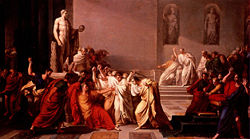- Climax (narrative)
-
The Climax is the point in the story where the main character's point of view changes, or the most exciting/action filled part of the story. It also known has the main turning point in the story. The climax (from the Greek word “κλῖμαξ” (klimax) meaning “staircase” and “ladder”) or turning point of a narrative work is its point of highest tension or drama or when the action starts in which the solution is given.[1][2]
Contents
Other uses
While the novel, short story, poetry and drama are the focus of much literary analysis, late 20th century literary criticism also recognizes the important similarities,the climax, of new genres like the feature film.
Arguably, the punch line of a joke is a good analogue of the climax of other forms of fictional narrative, though the absence of any falling action is an essential variation probably reflecting the nature of humor.
In many non-fictional narrative genres, even though the author lacks the same freedom to control the action and "plot", selection of subject matter, degree of detail, and emphasis permit an author to create similar structures.
The climax of the Greek plot line is when everything comes out. All the conflicts are at their worst and usually the battle is near or happening. There is a climax in almost every story.The point of greatest intensity or force in an ascending series or progression; a culmination. See synonyms at summit. A series of statements or ideas in an ascending order of rhetorical force or intensity. The final statement in such a series. A moment of great or culminating intensity in a narrative or drama, especially the conclusion of a crisis. The turning point in a plot or dramatic action. See orgasm (sense 1). A stage in ecological development in which a community of organisms, especially plants, is stable and capable of perpetuating itself. Also called climax community.
Although it is not necessarily true, a climax is known in most modern culture for being the final fight between the hero and villain. While this is true in most cases, the climax may be more of an epiphany the conflicted main character experiences, especially if the story does not have a villain in the first place (e.g. A Beautiful Mind). Also in most modern culture, especially films and video games, the final battle between a hero and villain will take place in a hazardous environment which already has a likely fatal occurrence without them trying to kill each other in the first place. A good example of this is Casino Royale, where the protagonist James Bond is fighting several thugs in an all-out brawl which is hazardous enough with each other but to add dramatic effect the building is structurally collapsing and sinking into the Grand Canal. Another example is Star Wars Episode III: Revenge of the Sith which takes place on a disabled pylon over a river of molten lava.
Anti-climax
An anti-climax is where something which would appear to be difficult to solve in a plot is solved through something trivial. For example, destroying a heavily guarded facility would require advanced technology, teamwork and weaponry for a climax, but in an anti-climax, it may just consist of pushing a red button which says "Emergency Self-Destruct", or even more so, simply filling out an eviction notice and destroying the building. A good example being the ending of The War of the Worlds, where, amidst the chaos of the extra-terrestrial takeover of planet Earth, the aliens are defeated by the most unexpected organism: the common cold. Another example could involve the protagonist faced with insurmountable odds and ultimately being killed, without accomplishing their goal, despite what appears to be a turning point for the character.
See also
References
- ^ Composition and Rhetoric for Schools. Original from Harvard University: Scott, Foresman and Co.. 1902. pp. 382. http://books.google.com/books?id=XwABAAAAYAAJ&pg=PA382&dq=Climax+(narrative)+-wikipedia&ie=ISO-8859-1.
- ^ Introduction to Theme-writing. Original from Harvard University: Allyn & Bacon. 1893. pp. 84. http://books.google.com/books?id=dP0AAAAAYAAJ&pg=PA84&dq=Climax+(narrative)+-wikipedia&ie=ISO-8859-1.
Narrative Character Plot Climax · Conflict · Dénouement · Dialogue · Dramatic structure · Exposition · Falling action · Plot device · Subplot · Trope-ClichéSetting Theme Style Diction · Figure of speech · Imagery · Literary technique · Narrative mode · Stylistic device · Suspension of disbelief · Symbolism · ToneForm Fable-Parable · Fabliaux · Fairy tale · Flash story · Folktale-Legend · Hypertext · Novel · Novella · Play · Poem · Screenplay · Short story · List of narrative formsGenre Adventure · Comic · Crime · Docufiction · Epistolary · Erotic · Faction · Fantasy · Historical · Horror · Magic realism · Mystery · Paranoid · Philosophical · Political · Romance · Saga · Satire · Science · Speculative · Superhero · Thriller · UrbanNarrator Alternating person · First-person · Second-person · Third-person · Third-person limited · Third-person objective · Third-person omniscient · Third-person subjective · Stream of consciousness · UnreliableTense Medium Related Categories:
Wikimedia Foundation. 2010.

